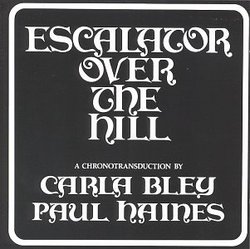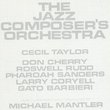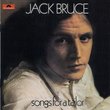| All Artists: Carla Bley, Paul Haines Title: Escalator Over the Hill Members Wishing: 5 Total Copies: 0 Label: ECM Records Release Date: 10/25/1994 Genres: Jazz, Pop Styles: Avant Garde & Free Jazz, Modern Postbebop, Swing Jazz, Bebop Number of Discs: 1 SwapaCD Credits: 1 UPC: 781182340329 |
Search - Carla Bley, Paul Haines :: Escalator Over the Hill
 | Carla Bley, Paul Haines Escalator Over the Hill Genres: Jazz, Pop
There's no easy way to describe Escalator over the Hill, one of the most ambitious works in 20th century music and one that seems to sum up much of the creative energy that was loose between 1968 and 1972, when it was conc... more » |
Larger Image |
CD DetailsSynopsis
Amazon.com There's no easy way to describe Escalator over the Hill, one of the most ambitious works in 20th century music and one that seems to sum up much of the creative energy that was loose between 1968 and 1972, when it was conceived, composed, and recorded. Beginning with a collection of Paul Haines's distinctive poems--brief, wittily surreal, sometimes aphoristic or elliptical--Carla Bley set out to arrange them as a continuous musical-theater piece, giving specific characters to them as well as melodies. In the process, she drew on available musical genres from Kurt Weill's theater music to free jazz and rock to create her own style, dispensing pieces among several instrumental groupings, from jazz orchestra to "hotel lobby band" to an electronic "phantom band." Bley then drew on an extraordinary collection of singers and musicians to realize the score, casting Jack Bruce and Linda Ronstadt as the lead voices, with appearances by jazz singers Sheila Jordan and Jeanne Lee. The soloists include Don Cherry, Gato Barbieri, Roswell Rudd, and Charlie Haden, while the fusion-oriented "Jack's traveling band" features Bruce and John McLaughlin. Bley's closing comment in the notes--"Anything not told, wasn't yet known"--is a fitting summary. Escalator's accomplishment is even more remarkable than its ambitions, creating syntheses of music and language that hadn't appeared before (and haven't since), and blazing a trail that few have had the creativity or energy to imagine following. As durable as it is visionary, its first public performances took place on European tours mounted in the late 1990s. --Stuart Broomer Similar CDs
|
CD ReviewsA Long Strange Trip Christopher Forbes | Brooklyn,, NY | 06/17/2003 (5 out of 5 stars) "Boy the late 60s and early 70s were a heady time. The sense of possibility, of creative energy running around the great urban centers of the world must have been truly amazing. Popular culture and popular arts were never taken more seriously than at this time, and there was a sense that anything was possible. Maybe it was something in the brownies at the time, but more amazing work was carried out simultaneously in all fields of the arts than at anytime since. Many of these works have dated rather badly, but others still crackle with the brilliance that characterized them when they were first created. Carla Bley's magnum opus, Escalator Over the Hill falls into this latter category. Enormous, unwieldy, and perhaps even over ambitious, the work still manages to stun, even in its excesses, and produce a powerful overall impression. And the performances are beyond belief. Bley and company calls escalator a "chronotransduction". Others might call it an opera, but it is an opera without much of a sense of coherent plot. The lyrics, by poet Paul Haines, are cryptic in the extreme. Haines makes Lennon's I Am the Walrus look like Alexander Pope! An example: Nurses dying their hair don't care, If the horse is locked, the house still there. It doesn't seem to matter to them, The traces of horses and pineapple and cheese, So many ingredients in the soup no room for a spoon.If you can find meaning in these lyrics, then perhaps you've indulged in some of those odd brownies lately! However, despite the elliptical lyrics, Bley creates a work of power and imagination. The score is filled with a myriad of influences, 1920s European cabaret music, acid rock, electronic experiments, free jazz, the concepts of Cornelius Cardew's Scratch Orchestra, and world music. All this combines to create a stew that is rich and imaginative, surprisingly coherent and deeply effecting. If Bley had written nothing but the Hotel Overture, the disc would be worth getting. This big band piece features solos by Rosewell Rudd, Perry Robinson on clarinet, one of the most searing and powerful solos ever by Gato Barbieri and soulful work by Charlie Haden. Other musicians who appear on the disc include Jack Bruce, who sounds amazing and carries the lion's share of vocals, as well as contributing his trademark intricate bass style to the rock sections, Linda Ronstadt, who also sounds better than I've ever heard her, Don Cherry, John McLaughlin in perhaps his best recorded work, singer Sheila Jordan, and the late lamented Jeanne Lea who electrifies the ending of the work. Bley sings much of the piece as well, in her weird and raspy voice, which is quite effective as it is used, as is the narration of Warhol stalwart Viva. Highlights from the disc in addition to the overture include the marvelous title tune, Escalator Over the Hill, which sets the scene for the opera, a run down seedy hotel, which may be a brothel. The music has that Kurt Weill-meets-the-circus style that Danny Elfman would borrow twenty years later for his film scores. Why, Linda Ronstadt's first solo on the album is a beautifully crafted country song, in which her talents shine. Detective Writer's Daughter features some amazing vocal work by Bruce and Bley and powerfully moves the "plot" along...such plot as there is. Small Town Agonist is one of the most powerful moments in the score. It seems to depict a rape or at least a scene of great degradation for the main female character, told to ominous and powerful chords in the brass and capped by a marvel of a solo by Gato Barbieri. (His sax is almost an extra character in the work, as it rises powerfully above scene after scene). The AIR and Rawalpindi Blues cuts are electrifying, with terrific Miles-like work from Don Cherry and wonderful guitar solos from McLaughlin. And the conclusion wraps everything up elegantly, as Jeanne Lee and Bruce weave a hypnotic spell during It's Again, the same music that opened the piece almost two hours before. One particular caveat...the work begins with a drone and ends with an "endless drone". The effect is akin to Wagner's opening E flat section in the Ring. But the "endless drone" really was meant to be that. On the original vinyl copy of the work, the grooves of the record looped, theoretically forever. On this disc, the producers decided to fill out the rest of the space of the CD with the drone to simulate the effect...then there is a little weird calliope music and the disc ends. It's kind of interesting to listen to this once as is, but the drone does get a little wearing after a while. So you may want to listen to maybe a minute or two of it and then cut it off...you won't miss much and will save yourself some aggravation. Bley's work since has been impressive, but outside of her earlier suite, A Genuine Tong Funeral, I don't believe she has ever equaled the power of this piece. Highly recommended as one of the pinnacles of jazz and jazz/rock from this period, as well as one of the trippiest jazz works ever. Just don't try to "figure it out". As Haines says in one of his memorable lines in the work, "Stop refusing to explain. Give up explaining."" Mind Your Step Your Mind Your Step Your Mind Your Step El Lagarto | Sandown, NH | 03/28/2006 (5 out of 5 stars) "Escalator Over The Hill is a Herculean, magnificent accomplishment. As music, one doesn't merely enjoy it, one revels it, like swimming in the ocean at midnight. Here is a rare instance of popular culture and high art intersecting, creating something totally new and unrepeatable. Originality on this order of magnitude thrashes everything that has come before it and informs everything that follows. The details of this epic achievement are too long to summarize, even listing the all-star cast of players would consume too many words. For the best review I've managed to find, track down "Stranded Escalator Over The Hill" by Marcello Carlin, published in Stylus Magazine. Mr. Carlin offers a thorough and highly intelligent perspective on the work, my goal is much less ambitious. I merely want to point you towards the Up escalator, which, according to Heraclitus, is the same as the Down escalator. Imagine it's late and you've wandered into a crummy bar/nightclub in a derelict section of some nameless, grimy city. The nation and year are unknown. You're transfixed by a tall cigarette girl with a massive shock of blonde hair. She moves easily between the patrons and performers. In the corner, Kurt Weill plays piano, doom and decadence haunt each jolly note. At the bar, Samuel Beckett, Henry Miller, and William Burroughs scribble words on notebook paper, tear the pages into scraps, stuff the scraps unceremoniously into an overturned black bowler hat, (helpfully supplied by a taciturn Rene Magritte), retrieve said scraps randomly, and lay them on the bar with care. Tristan Tzara and Marcel Duchamps ascend and descend the stairs, in that order. On the bandstand, the twelve known ghosts of Charlie Parker play in unison except when they let each other solo. The bartender insists on listening to an Indian radio station, no one complains. Several rock musicians drag their amplifiers in out of the rain; some of them do or do not get killed while plugging in and tuning up. The singer cries, wails, and moans like there's no tomorrow, like tomorrow's already all used up. So many ingredients, no room for a spoon." And it's Again Mushroom | UK or in the Shpongle Multiverse | 09/05/2006 (5 out of 5 stars) "This is a monumental work of art and must be recognised as extremely significant in the history of music. If you are fond of jazz from the perspective of Miles Davis' electronic work or Jazz Fusion you should definitely consider buying this due to the sheer density and scope that the music is presented. In true musical, rock opera (Jazz Opera) tradition the opus starts with an overture, it has its fair amount of squealing and free soloing. The scene is then set for a type of musical theatrical concept LP with parts played by significant voices of the time, the songs are a lot more accessible than you might think being a jazz work, surreal dream like excursions in a Burroughsesque 'Interzone' that initially takes place in 'Cecil Clark's Old Hotel' and moves out into the desert with different bands for different locations. You could see it as an unfolding, re contextualizing of the history of Jazz through big band, bop, eastern modal fusion and minimalism taking place in a surreal dreamscape that is no place, with an abstract libretto by Paul Haines, Brion Gysin like cut-ups reporting sensations of the time, dealing with relationships, thoughts and expressions. What makes this significant for me is the two main points where the work becomes electronic with the amplified guitar work of Mahavishnu John McLaughlin. The most significant of these is the whole suite of A.I.R (All India Radio), Rawalpindi Blues and End of Rawalpindi. There is nothing I have heard that sounds like this and if you buy this work for one reason this should be it. It is a kind of duet between McLaughlin and Trumpeter Don Cherry, although both were not recorded together and unfortunately never got to work with one another. This is where everything changes, this is where John Coltrane's spiritual quest is realised, a truly transcendental piece of quite incendiary music with the most amazing cosmic atmosphere generated by Don Cherry. I have been listening to this work for over 14 years and still do not tire of it, losing myself in a work really takes you on a major dreamlike journey that sounds like nothing else. Because of it's length it is a bit of an excursion to take time out to listen to it. It is part Music Hall, part Kurt Wiell, part ethnic, part fusion and part avant-garde. If you open yourself up to it you might even start singing along to the songs. This is a work of unfathomable genius and ambition from a great composer and band leader."
|

 Track Listings (15) - Disc #1
Track Listings (15) - Disc #1
